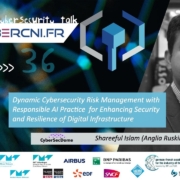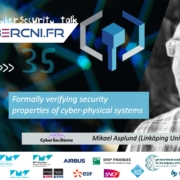[T36] Dynamic Cybersecurity Risk Management with Responsible AI Practice for Enhancing Security and Resilience of Digital Infrastructure – Shareeful Islam
On Fri, July 26th, 2024, 2h00pm CET, we welcome Shareeful Islam from Anglia Ruskin University, UK for another edition of TALK.CYBERcni.fr on “Dynamic Cybersecurity Risk Management with Responsible AI Practice for Enhancing Security and Resilience of Digital Infrastructure – Shareeful Islam”. Share and join!
We are excited to welcome Dr. Shareeful Islam from Anglia Ruskin University for a compelling talk on “Dynamic Cybersecurity Risk Management with Responsible AI Practice for Enhancing Security and Resilience of Digital Infrastructure.” In this session, Dr. Islam will address the growing sophistication of cyberattacks and the critical need for dynamic cybersecurity risk management. Learn how hybrid AI-enabled models, combining linear regression and deep learning, can help manage risks more effectively and ensure the development of trustworthy AI systems.
You are cordially invited to join the free live stream on youtube and LinkedIn! Please share the link https://talk.cybercni.fr/36 with your interested friends!
Trailer: https://youtu.be/lcDndbVe8ds
LinkedIN Event: https://www.linkedin.com/events/7221126855918063619
Facebook Event: https://www.facebook.com/events/366087109924061/
Youtube: https://www.youtube.com/watch?v=3ZSARwpfwgA&list=PLdftPKA9mTfaDJxqwexil2mPhUFIA9ITd
Stream redirect (for every edition): https://TALK.cyberCNI.fr/stream
Newsletter with invitations: Subscription on https://TALK.cyberCNI.fr
Help us spreading the news
The best talks are those with an interested diverse audience! Therefore, please use the following media to spread the news in your networks:
Thank you!
Abstract
The sophistication of cyberattacks has significantly increased, making it almost certain that organizations can be victims of cyberattacks at any time. Managing cybersecurity risk is critical for any organization so that informed decisions can be made to tackle risks before they materialize. However, performing effective risk management is always challenging due to the constant changes in organizational infrastructure and security posture, including the adoption of new applications and the reconfiguration or updating of existing assets and their dependencies, as well as the potential exploitation of vulnerabilities. Despite the wider adoption of AI enabled solution in cybersecurity , but lack of focus on the analysing dynamic parameters using AI models and their integration into cybersecurity risk management. Additionally, AI-enable cybersecurity solution needs to assure the Responsible AI practice for trustworthy AI system development and use
This talk presents dynamic Cyber Security Risk Management (d-CSRM)) to tackle this challenge by integrating for assessing and managing the risk. It considers hybrid AI-enabled model that combines both linear regression and deep learning, with responsible AI practice to assess the risk.
Watch the trailer linked above!
Shareeful Islam
Dr. Shareeful Islam is an Associate Professor in Cybersecurity at the Faculty of Science and Engineering, Anglia Ruskin University(ARU). He is currently visiting professor LUT School of Engineering Sciences, Lappeenranta, Finland and previously worked as a visiting professor at the National Institute of Informatics (NII), Japan, and a visiting researcher at SBA Research, Austria. He has over 22 years of experience in teaching , administration, and research. He published more than 90 papers and secured ca 1.5 M £ funding mostly from the national and EU funding agency with experienced with lead and manage project. He has successfully supervised to timely completion 11 PhDs and MPhils and currently leading Horizon project for ARU. He has published more than 90 papers in different top ranked journals and conferences. His research interest includes cybersecurity risk management, Responsible AI, AI-enabled cyber security, and regulatory compliance.
About the Anglia Ruskin University (ARU)
named one of the top 40 universities in the UK and top 350 institutions in the world, in the Times Higher Education (THE) World University Rankings in 2023. ARU teaching and research focuses on Chelmsford, Cambridge, Peterborough and rated Gold in the Teaching Excellence Framework The school of computing and information science boasts state-of-the-art research facilities, equipped with the latest technology and resources necessary for conducting advanced research in cybersecurity. CIS includes a number of online specialized labs including threat and forensic analysis, penetration testing, and evidence visualization. CIS is a dynamic hub for academic excellence and innovation in the field of computer science, information technology, and cybersecurity. Faculty members of CIS are distinguished experts in cybersecurity, artificial intelligence, and network defence.
Talk.cybercni.fr
The Cyber CNI Lecture Series is a free monthly event that typically takes place on the last Friday of the month from 2pm to 3h30pm CET.
The Cyber CNI Speaker series aims to raise awareness and understanding of cyber security issues among all audiences. It aims to enable an ongoing dialogue between experts from industry and academia and the general public (citizens, families, small and large businesses, public organizations, etc.). All of us are concerned.
The events are broadcast live on Youtube (https://talk.cybercni.fr/) and LinkedIn, allowing worldwide remote participation – including a tool to participate in the discussion.
You can add the event calendar via ICS, webcal, HTML.
How the digital transformation is changing our lives
Our society relies more and more on information and operational technologies. Examples include water, energy, heat and cooling supply, communications, healthcare, production and processing of goods, transportation, national security, banking, research and education, and food production.
What all these areas have in common is that they make intensive use of networked distributed computer systems. These systems can be attacked in many ways. This is no longer just a problem for computer “pros” because computer systems are essential to all of us. The effects of “cyber-attacks” range from power outages to the collapse of the health care or banking sectors.
Program and registration: https://talk.cybercni.fr/




